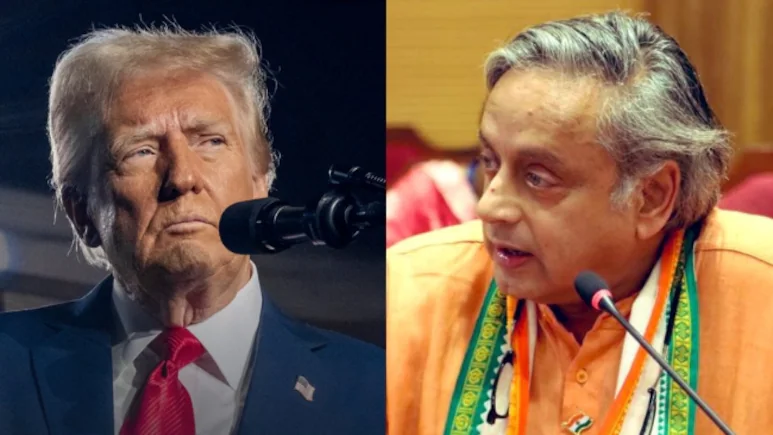Congress MP Warns US of Pakistan’s Dubious Past in Light of Trump’s Lunch with Army Chief
In a bold statement, Congress Member of Parliament Shashi Tharoor has questioned the wisdom of US President Donald Trump’s recent lunch meeting with Pakistan Army Chief General Asim Munir. The meeting has stirred disquiet in India, especially considering Pakistan’s notorious history of harboring terrorists, prominently Osama bin Laden, who was discovered near a Pakistani military facility. Tharoor’s remarks resonate amidst mounting concerns regarding Pakistan’s continued sponsorship of terrorism and its implications for regional stability.
Tharoor’s comments were made during a press conference in Thiruvananthapuram, Kerala. He expressed that many American lawmakers have not fully reckoned with Pakistan’s culpability in the Osama bin Laden episode. The terrorist leader was responsible for the tragic events of September 11, 2001, which led to nearly 3,000 fatalities in the United States. Tharoor urged: “People in the US could not have forgotten the Osama episode so quickly. Pakistan’s culpability in hiding this man cannot be so easily forgiven by the Americans.”
The lunch meeting raises pressing questions about the potential implications for India-Pakistan relations, particularly amid accusations of continued terrorism emanating from Pakistani soil. Tharoor hopes that President Trump takes this opportunity to address Pakistan’s support for terrorism directed at India, urging a serious discourse on the issue during this significant meeting.
Context and Implications of the Trump-Munir Meeting
The lunch garnered reactions from various quarters, especially in India where skepticism over Pakistan’s intentions prevails. Tharoor articulated hope that President Trump would convey the importance of confronting Pakistan on its alleged support for terrorists, especially in light of recent attacks in India. The gory Pahalgam terror attack, which resulted in 26 casualties, was front of mind for many in the Indian government, with External Affairs Minister S. Jaishankar condemning the extremism linked to Munir’s statements regarding Kashmir and the identity of Pakistan as a “superior culture.”
“The terrorists who committed the Pahalgam attack were driven by Munir’s extreme religious outlook,” Jaishankar stated. The Indian government maintains that it possesses credible evidence, asserting that the attack was orchestrated by the Pakistani deep state. Such comments from Indian officials reflect the heightened tensions and the ongoing war of words between India and Pakistan, particularly regarding Kashmir.
In recent years, India has consistently warned the international community about Pakistan’s ties to terrorism. Tharoor’s comments, coupled with recent intelligence indicating that Pakistan-backed terrorists have attempted to stage attacks in London and Moscow, underscore the gravity of the situation. As per the report by[NDTV](https://www.ndtv.com), such links to global terrorism have started to draw concern and scrutiny from multiple nations.
A Timing That Raises Questions
The timing of the Trump-Munir meeting is also under scrutiny. General Munir’s visit to the White House came shortly after President Trump had a phone conversation with Indian Prime Minister Narendra Modi. The latter had declined an invitation to meet Trump at the White House, which has led to speculation regarding the diplomatic dynamics at play. Modi was clear during their discussion, asserting that India would not seek third-party mediation regarding Pakistan’s illegal occupation of Kashmir.
Trump’s repeated claims of having brokered a ceasefire, amidst India’s firm rejection of his statements regarding mediation, have created confusion and concern about the direction of US policy in South Asia. Modi’s direct communication with Trump emphasized India’s stance on sovereignty and Pakistan’s actions, which were evidently overlooked by the US administration.
During the phone call, Modi firmly stated, “No trade deal talk or mediation offer during the Pakistan conflict.” Nevertheless, Trump proceeded to publicly claim ownership of the ceasefire agreement, highlighting a possible misalignment in understanding between the two leaders.
Concerns About Pakistan’s Role
The Indian government remains committed to asserting its historical grievances with Pakistan, especially in the wake of terrorism. The stark reality is that, despite India’s efforts to address these issues diplomatically, incidents such as the Pahalgam attack only serve to highlight the ongoing risk posed by Pakistan.
The Trump-Munir meeting coupled with the subsequent events underscores the complexities of international politics where terrorism continues to remain a pressing concern. As the world grapples with balancing diplomatic relations and security imperatives, the expectations from Pakistan to address terrorism become ever more paramount.
In light of these developments, it is crucial for the international community to engage with Pakistan firmly and to scrutinize its actions critically. As Tharoor poignantly stated, “I hope that in these interactions, the Americans understand the critical nature of these issues… because that would also be in America’s interest.”
For a deeper understanding of the ongoing issues surrounding terrorism in the region, you can read about[Pakistan’s Terror Threat](https://www.bbc.com/news/world-asia-61020037) and its historic context in relation to[Kashmir’s Disputed Status](https://www.cnn.com/2023/05/15/asia/kashmir-india-pakistan-intl-hnk/index.html). The responsibility now lies with global leaders to ensure that they discern fact from error when engaging with nations historically linked to terror, thereby securing a more stable future for all regions involved.
In summary, the engagement between the United States and Pakistan demands scrutiny, particularly as it relates to security dynamics in South Asia. Tharoor’s warnings reflect a broader concern that cannot be ignored, especially in an era where global terrorism continues to evolve. The real challenge lies not only in addressing these concerns but also in fostering dialogues that genuinely aim for peace and stability across borders.
DISCLAIMER
We have taken every measure to ensure that the information in this article and on our social media platforms is accurate, verified, and obtained from reliable sources. For feedback or complaints, please contact us at info@hamslive.com.


